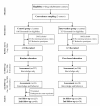Peer-based behavioral health program for drug users in China: a pilot study
- PMID: 21899764
- PMCID: PMC3189137
- DOI: 10.1186/1471-2458-11-693
Peer-based behavioral health program for drug users in China: a pilot study
Abstract
Background: Many injection drug users (IDUs) in China have high risk sexual behaviors that contribute to the spread of HIV infection. Although many IDUs in China move through drug rehabilitation centers, this opportunity for sexual health education has largely been overlooked.
Methods: A convenience sample of 667 drug users from two rehabilitation centers in South China was recruited in the study. Two hundred and forty seven drug users from a single Guangdong Province rehabilitation center received the peer-based education intervention, while 420 drug users from another rehabilitation center received routine HIV/STI education and was used as the control. One hundred and eighty nine (22.1%) individuals refused to participate in the study. HIV/STI behavioral and knowledge domains were assessed at 3 months in rehabilitation centers after the intervention (first follow-up) and at 2-23 months in the community after release (second follow-up).
Results: Drug users who completed the intervention reported more frequent condom use with casual sex partners (60.0% vs. 12.5% condom use every time, p = 0.011) and less frequent injection (56.7% vs. 26.4% no injection per day, p = 0.008) at the second follow-up compared to those in the routine education group. Loss to follow up was substantial in both control and intervention groups, and was associated with living far from the detention center and having poor HIV knowledge at baseline.
Conclusions: This study shows that rehabilitation centers may be a useful location for providing behavioral HIV/STI prevention services and referral of individuals to community-based programs upon release. More research is needed on behalf of detained drug users in China who have complex social, medical, and legal needs.
Figures
Similar articles
-
Reducing substance use and risky sexual behaviour among drug users in Durban, South Africa: Assessing the impact of community-level risk-reduction interventions.SAHARA J. 2017 Dec;14(1):110-117. doi: 10.1080/17290376.2017.1381640. SAHARA J. 2017. PMID: 28969490 Free PMC article.
-
Impact of a longitudinal community HIV intervention targeting injecting drug users' stage of change for condom and bleach use.Am J Health Promot. 1997 Sep-Oct;12(1):15-24. doi: 10.4278/0890-1171-12.1.15. Am J Health Promot. 1997. PMID: 10170430
-
HIV infection and risk, prevention, and testing behaviors among injecting drug users -- National HIV Behavioral Surveillance System, 20 U.S. cities, 2009.MMWR Surveill Summ. 2014 Jul 4;63(6):1-51. MMWR Surveill Summ. 2014. PMID: 24990587
-
HIV/AIDS behavioral interventions in China: a literature review and recommendation for future research.AIDS Behav. 2009 Jun;13(3):603-13. doi: 10.1007/s10461-008-9483-0. Epub 2008 Oct 28. AIDS Behav. 2009. PMID: 19015973 Free PMC article. Review.
-
HIV prevention intervention for substance users: a review of the literature.Subst Abuse Treat Prev Policy. 2019 Jan 3;14(1):1. doi: 10.1186/s13011-018-0189-7. Subst Abuse Treat Prev Policy. 2019. PMID: 30606266 Free PMC article. Review.
Cited by
-
The ethics of research in compulsory drug detention centres in Asia.J Int AIDS Soc. 2012 Dec 5;15(2):18491. doi: 10.7448/IAS.15.2.18491. J Int AIDS Soc. 2012. PMID: 23237589 Free PMC article. No abstract available.
-
Peer education for HIV prevention among high-risk groups: a systematic review and meta-analysis.BMC Infect Dis. 2020 May 12;20(1):338. doi: 10.1186/s12879-020-05003-9. BMC Infect Dis. 2020. PMID: 32398032 Free PMC article.
-
Human rights research and ethics review: protecting individuals or protecting the state?PLoS Med. 2012;9(10):e1001325. doi: 10.1371/journal.pmed.1001325. Epub 2012 Oct 16. PLoS Med. 2012. PMID: 23091422 Free PMC article.
-
Strategies to control HIV and HCV in methadone maintenance treatment in Guangdong Province, China: a system dynamic modeling study.Subst Abuse Treat Prev Policy. 2018 Jan 10;13(1):1. doi: 10.1186/s13011-017-0140-3. Subst Abuse Treat Prev Policy. 2018. PMID: 29321039 Free PMC article.
References
-
- State Council AIDS Working Committee Office C; UN Theme Group on HIV/AIDS in China. A joint assessment of HIV/AIDS prevention, treatment and care in China. Beijing: State Council AIDS Working Committee Office, China, UN Theme Group on HIV/AIDS in China; 2003.
-
- State Council AIDS Working Committee Office C; UN Theme Group on HIV/AIDS in China. A joint assessment of HIV/AIDS prevention, treatment and care in China. Beijing: State Council AIDS Working Committee Office, China, UN Theme Group on HIV/AIDS in China; 2007.
Publication types
MeSH terms
Grants and funding
LinkOut - more resources
Full Text Sources


